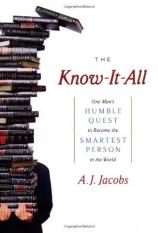The Know-It-All: One Man's Humble Quest to Become the Smartest Person in the World
Review
The Know-It-All: One Man's Humble Quest to Become the Smartest Person in the World
In the very beginning, all knowledge was personal. Knowing important facts, such as where to find water and shelter, how to avoid saber-toothed tigers, and how to kill chickens for dinner, were the difference between life and death for our caveman ancestors. Some knowledge, like "don't fall asleep on a glacier," was slow in coming for some, but eventually people gained enough of the knowledge that allowed them not only to survive, but also to form communities.
Once that happened, we shifted from individual knowledge to group knowledge. It wasn't enough to know what caves made good apartments, but you had to also learn about the people around you --- to know, for example, that you didn't necessarily want to have your mother-in-law living in your cave. Even more importantly, we developed the desire to share our individual knowledge with those around us, so man developed education and scholarship, which led to developments such as third-period algebra class, not to mention Arizona State University.
Eventually, man's quest for knowledge culminated in the desire to gather that knowledge together in an easily understood, leather-bound format. Although early efforts to collect human knowledge ended tragically --- the burning of the library at Alexandria, the sack of Rome by the Vandals, mothers across America throwing out comic-book collections --- finally, some brave souls put together the first edition of the Encyclopaedia Britannica, and the rest is history. The Encyclopaedia Britannica would contain all of human knowledge, to be distributed the world round through the intense labor of generations of door-to-door encyclopedia salesmen.
With the publication of A.J. Jacobs's book, THE KNOW-IT-ALL, the progress of human knowledge all but begins its first tentative backwards steps. To the extent that THE KNOW-IT-ALL is about anything, it is about the author's attempt to take the group knowledge of thousands of cultures and untold millions of people, as represented in the pages of the Encyclopaedia Britannica, and make it his own --- to single-handedly arrest, or even reverse, the course of human progress. Jacobs sets himself the task of reading (or skimming, or at least glancing at) each and every entry in the Britannica one at a time, for over a year, in ---- as the subtitle so immodestly suggests --- "one man's humble quest to become the smartest person in the world."
The evident --- even, thankfully, the self-evident --- absurdity of this quest raises some very specific questions: "Why?" Or "No, seriously, why?" Or "You've got to be kidding me, seriously?" For these deep, searching questions, THE KNOW-IT-ALL has some specific answers, as follows:
1. Reading the encyclopedia is a means to an end, namely, cracking cheap jokes at the expense of celebrities. Some of the celebrities are in the Britannica already, and Jacobs is easily able to score off of George Bernard Shaw for posing nude, and off Pythagoras for not liking beans, while other targets like Reggie Jackson and Madonna are more contemporary. This gets tiresome fast, and to his credit, even Jacobs realizes that he shouldn't just be reading the encyclopedia in order to make silly Roger Ebert jokes.
2. Reading the encyclopedia is a way for Jacobs to try to impress people at cocktail parties. For one thing, the whole bit about reading the Britannica is guaranteed to give you cocktail-party subject matter or, at the minimum, get you talked about. Jacobs lives in New York and goes to an astonishing number of cocktail parties and dinner parties and Mensa meetings, at which he regularly throws out helpful little facts he has gleaned from his encyclopedia reading, which, in turn, makes him look like a jerk. This is irritating enough, but --- you watch --- you'll find yourself doing it soon enough.
(I know this, because it happened to me. I was going to a dinner party with my girlfriend, and I was reading THE KNOW-IT-ALL while she was getting ready. She --- very sensibly --- wanted to know why I was reading it, and I unthinkingly tossed out a little tidbit of wisdom from the pages --- that the Holland Tunnel was actually named after its engineer, one Clifford Holland. At the dinner party, hours later, she threw out the factoid on her own --- but misremembered it, asking if anyone could guess who the Hudson River was named after. A dangerous game, this.)
3. Reading the encyclopedia is a way for Jacobs to try to impress his family. The best parts of THE KNOW-IT-ALL describe Jacobs and his quirky relationships with his practical-joker father, his unbelievably patient and tolerant (up to a point) wife, and his intellectually overbearing brother-in-law. Jacobs cleverly manages to counterpoint his encyclopedia readings to various encounters with his family. For example, the encyclopedia entry about "language" is illustrated by a run-in with a young nephew who is a self-appointed deputy in the Grammar Police.
None of these are very good reasons to read the Encyclopaedia Britannica, but there are good reasons to read THE KNOW-IT-ALL. Setting aside the essential nerdiness of his quest, Jacobs actually seems to have a small degree of talent in this writing business. The episodes involving his wife and family are written in a very charming, light way, and, if you're in exactly the right mood, the whole thing can be amusing.
Overall, Jacobs's quest is silly at best, unappealing at worst. The one redeeming factor is that he actually seems to recognize this. He pokes fun at himself for doing it in the first place and is generous indeed in his self-deprecation. THE KNOW-IT-ALL is really less about how we learn things and more about the importance of self-knowledge --- as Jacobs encounters the wisdom of the ages and begins the slow process of applying it to his own life. Therefore, instead of halting the course of scholarship, Jacobs manages to bring it back, full-circle, to its roots in the self, with the promise of passing that knowledge to future generations.
Reviewed by Curtis Edmonds (curtis@txreviews.com), who writes movie reviews at http://www.txreviews.com. on January 22, 2011
The Know-It-All: One Man's Humble Quest to Become the Smartest Person in the World
- Publication Date: September 21, 2004
- Genres: Nonfiction
- Hardcover: 400 pages
- Publisher: Simon & Schuster
- ISBN-10: 0743250605
- ISBN-13: 9780743250603





